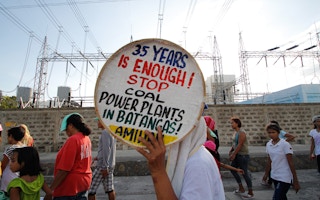International funders should use the Philippines to test a new way of scaling up clean energy that prioritises careful planning by investee countries over big political statements, which have impeded international energy transition deals in other countries, United States-based philanthropy group Rockefeller Foundation has said.
The Philippines, which relies on pollutive coal for over half of its electricity supply, will need US$9 billion in immediate funding to scale up renewable energy in the decades ahead, and the final bill by 2050 could reach US$165 billion, the foundation said in a report released Thursday. The Philippines has said it wants to achieve a 50 per cent renewable share in power generation as early as 2040.
The report said that the Southeast Asian country would benefit from a Just Energy Transition Partnership (JETP), a funding package for developing countries to transition to clean power, financed by wealthy donor countries and private investors. The JETP model was launched with much fanfare at the COP26 climate summit. JETPs have also been signed for Vietnam, Indonesia, South Africa and Senegal.
An energy transition deal for the Philippines should begin with the government overseeing technical negotiations for developing a “nationally appropriate” investment plan, rather than start off the process with a high-level political deal. Doing things the other way round in the past has resulted in “unrealistic expectations and misunderstandings”, the report added.
Since South Africa became the first country to sign a JETP in 2021, the programmes have faced several setbacks. Sweeping blackouts in South Africa have vexed efforts to close coal plants. Critics decry a lack of government consultation in Vietnam’s US$15.5 billion plan. The loudest complaints have come out of Indonesia’s huge US$20 billion package, which local officials say could amount to a debt trap without better lending terms.
The hope was that Indonesia could use the funds for the early retirement of its many young coal power stations. But late last year, its energy ministry said they would be left on, with cleaner fuels and carbon capture technologies used to slash emissions.
“To date, JETPs have been long on promise but short on progress,” said Rockefeller Foundation president Dr Rajiv Shah. The foundation’s report, based on engagements with JETP stakeholders, is a “clear-eyed assessment” of what is needed for the deals to succeed, he said.
The Rockefeller Foundation said philanthropic money could be used to launch a “country platform” in the Philippines, that will involve policymakers and a multilateral development bank drafting and stress-testing investment plans, before matching projects with investors. The model, if successful, should be replicated in future JETP deals.
Dr Rowena Guevara, undersecretary of the Philippines’ Department of Energy, said at the report’s launch that there is “strong interest” to focus on renewables development, building port infrastructure to facilitate offshore wind projects, modernising electricity grids and shutting coal plants early.
By 2050, grid upgrades would cost US$9 billion, and US$156 billion is needed to boost renewable energy capacity, the Rockefeller report said.
Donors in short supply
Beyond the problematic focus on political announcements, the Rockefeller Foundation said the JETP model is also hamstrung by low concessional funding and an inconsistent role for multilateral lenders. These constraints have placed a “heavy political burden” on the International Partners Group (IPG), which includes the European Union, UK, US and Japan.
The foundation’s report recommended that more countries join the IPG to provide concessional finance – often regarded as loans with lower interest rates or higher risk appetite. It also suggested multilateral development banks “make better use of the money already in the system”, while asking for more capital injection from member governments.
As it stands, Thailand, Mongolia and Kazakhstan, along with several African and American nations, have said they are keen to receive JETP funding. But there isn’t a proper pathway to process this interest, the report said. These countries should jointly announce interest for such deals to show “there is considerable pent-up demand”.
Globally, reaching net-zero emissions by 2050 will require investments of over US$5 trillion a year in the energy sector – over double the current spending – according to consultancy firm Deloitte.
Little of existing investments is flowing into developing nations because of their lower credit ratings and higher project interest rates. Foreign project developers in Southeast Asia have also complained of protectionist policies, though national governments say they are needed to keep electricity prices low and protect the local workforce.
Late last year, an international coalition announced a plan to use carbon credits to finance the early closure of two coal plants in the Philippines. The initiative involves Singapore’s central bank and the Rockefeller Foundation. London thinktank Transition Zero has said retiring all coal plants in the Philippines will cost over US$10 billion, excluding the cost of replacing them with clean energy.
Want more Philippines ESG and sustainability news and views? Subscribe to our Eco-Business Philippines newsletter here.










